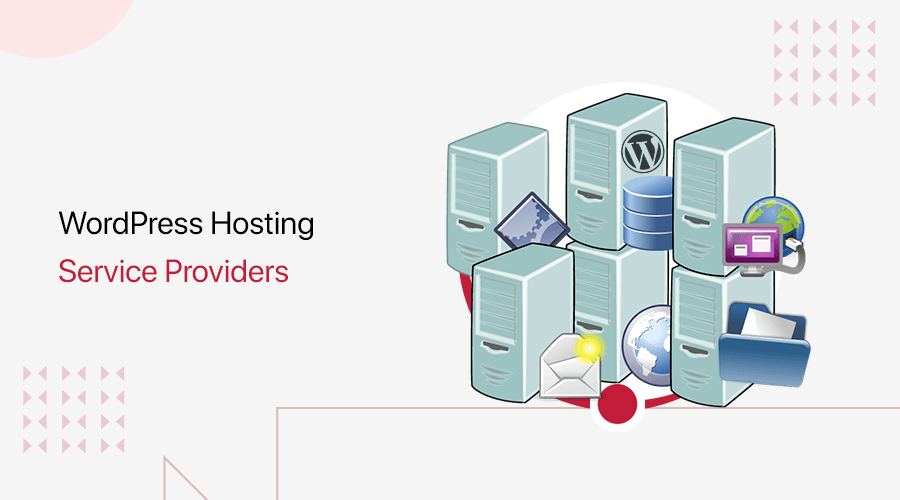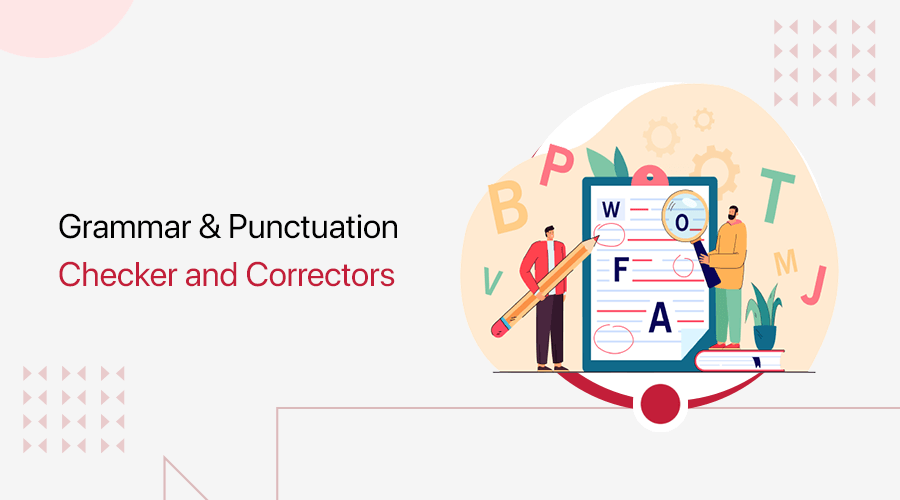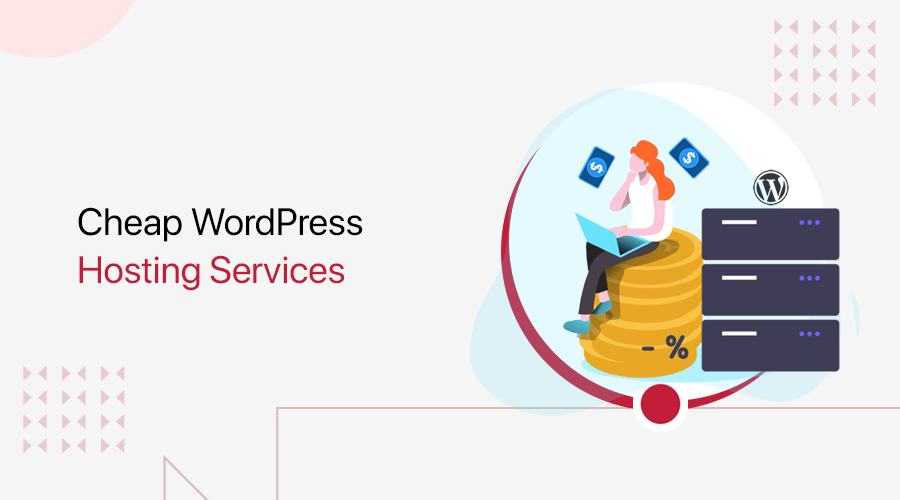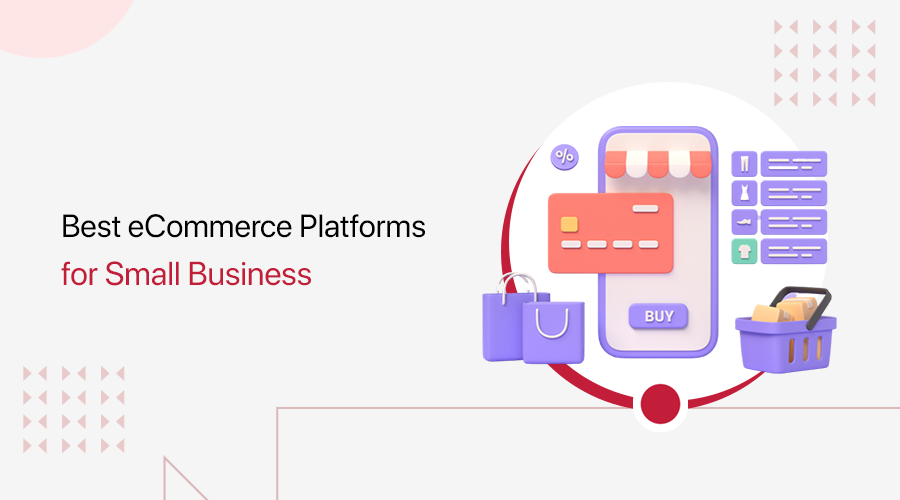
Are you wondering which are the best eCommerce platforms for a small business? Then, you’ve come to the right place.
eCommerce platforms are crucial for global reach, offering 24/7 convenience, cost-effectiveness, and data-driven insights. Also provides diverse payment options, scalability, and effective marketing, transforming business operations and enhancing consumer experiences.
But, there are tons of eCommerce platforms in the market, and choosing the best eCommerce platform can be difficult.
To help you with this, we’ve talked about what you need to look for in your eCommerce platform. And then, prepared a list of the best eCommerce platforms for any small business on the web.
Moreover, we’ll compare its features, pros, and cons to help you figure out the best for you.
Let’s get started!
Table of Contents
What to Look for in an eCommerce Platform?
There are tons of eCommerce platforms out there, and, they all differ according to the services and features they provide and what they are compatible with. So, choosing the best is not as easy as it sounds as different stores and businesses have different requirements and goals.
So, it’s important to choose the best eCommerce platforms according to your needs for a small business. For that, you’ve to keep the following points in your mind while choosing some of the best eCommerce platforms for your small business.
i. Ease of Use
The eCommerce platform of your choice needs to be easy to use and set up. It should be able to help you avoid all the hassle and get into making your site look elegant easily.
Having a simple and easy building tool with minimal setup and configuration is very crucial when choosing the best eCommerce platforms.
ii. Cost-efficient
If you’re just getting into making your site, then you probably don’t have much of a budget to invest in an expensive platform. There are many different platforms on different price ranges on the web.
You’ve to properly research and go with the one that falls under your budget and remains feature-rich. To avoid any future problems, it’s also important to look into long-term costs and affordability before choosing a platform.
iii. Features
There are many features that an online store should have to grow at a faster pace. The eCommerce platform of your choice should include some of the most crucial features like SEO (Search Engine Optimization) and marketing features to help you gather more traffic.
Also, it should have an easy drag-and-drop tool. Or simple design features to make your online store elegant and showcase your product.
Moreover, your platform needs to be able to add new and important features and extend the functionality of your store. You should be cautious of the extendibility and functionality the platform provides.
iv. Support
Your platform should provide you with good support and flexible timing so that your problems don’t stop your efficiency. It should provide flexible or preferably 24/7 support service and have good customer service and reputation.
And, having an active community with experts to help you is also very important in getting your eCommerce platform best for your small business.
21+ Best eCommerce Platforms for Small Business & Startups 2024
These are some of the best eCommerce platforms on the web that can help you make an online shop for your small business. We’ll talk about its features, pros, and cons to help you easily decide what eCommerce platform you need to go for.
So, let’s start with the list.
1. WooCommerce
As one of the best eCommerce platforms out there, WooCommerce covers over 43.35% of all online stores on the web. It’s a free and open-source platform that works with WordPress to provide you with a great online store.
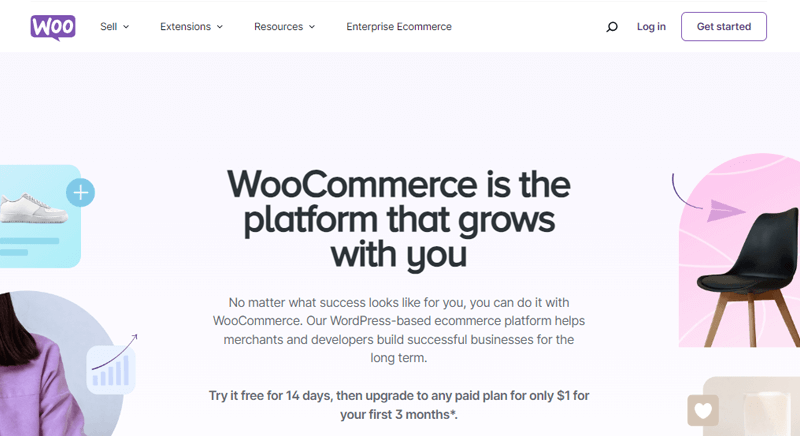
You can easily craft an eCommerce shop that you want without much of a hassle. However, you have to take care of the hosting and domain name for it.
As WooCommerce is open-source, many people and developers are contributing to it. They work to extend more of its features and add more extensions to WooCommerce itself. You can find tons of different extensions for WooCommerce in its directory.
If you are confident enough in your skills, then you can contribute to WooCommerce to make it a better platform.
Pros:
- Free and open-source platform.
- Highly customizable and easily extendable.
- Provides different marketing options and easy integration for third-party tools.
- Won’t share your sale details.
- There is a great community of WordPress experts and users to share and discuss.
- You can contribute to it.
Cons:
- You need to take care of hosting and domain names.
- Hosting can be expensive depending on options.
Pricing:
It’s free of cost so you can install it right from your WordPress dashboard. Also, you can download it from the plugin directory of WordPress.org or its original site is also possible.
But you have to take care of hosting and domain name which can start from $2.95 per month and $6.88/month respectively. Also, there are several paid extensions available that you can use.
2. Shopify
With millions of users and $444 billion global economic activities, Shopify is one of the best eCommerce platforms for a small business. It’s a platform that includes everything you need to make your eCommerce store out of the box.

Moreover, it’s a fully hosted platform and takes care of your domain and hosting needs. It comes with a huge number of tools and features to make your eCommerce site attractive and featureful. So, you can easily showcase your products and services.
Besides, it requires no coding knowledge to get started and you can make an elegant online shop in no time. Plus, they also provide good support if you ever need it.
Pros:
- It’s very easy to make your eCommerce shop and requires no coding knowledge.
- Provides you with a 3-day free trial.
- Comes with different themes with varied designs.
- Comes with Shopify payment.
Cons:
- Charges transaction fees while using other than Shopify payment.
- Can be on an expensive side.
- Advanced feature integration requires a person of expertise.
Pricing:
This eCommerce platform is premium. So, you’ve to buy it by choosing one of its pricing plans as below:
- Basic: $19 per month, best for small businesses and startups.
- Shopify: $49 per month, best for growing online business.
- Advanced: $299 per month, great for scaling business with advanced reporting.
Have a look at the full comparison between WooCommerce vs Shopify.
3. Wix
A cloud-based website builder, Wix is one of the best eCommerce platforms for a small business. It comes with an easy drag-and-drop design tool that lets you create an online store easily without coding knowledge.
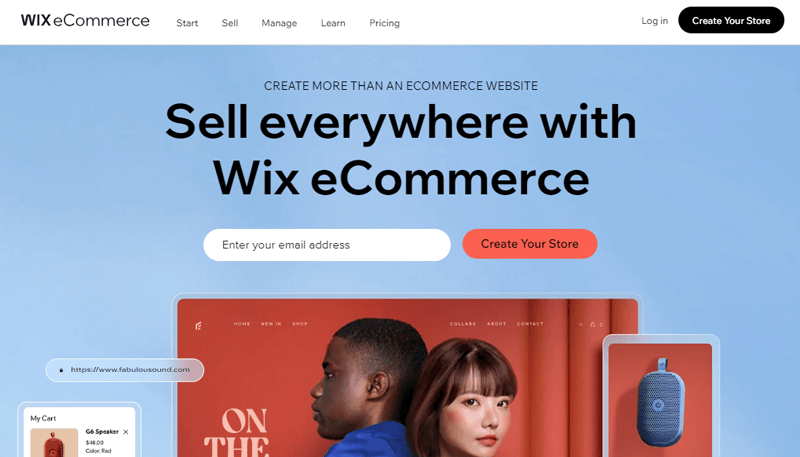
Additionally, it comes with different templates for you to showcase your products and services easily and is very easy to customize for your every need. It provides responsive website designs compatible with all sorts of mobile devices.
Moreover, it’s a fully hosted platform, so you don’t have to worry about hosting services. It also provides you with a free subdomain that looks like www.sitename.wixsite.com.
Pros:
- Comes with a huge number of templates to choose from.
- Fully-hosted platform
- Comes with a free subdomain.
- Different customization options using third-party integrations.
Cons:
- Lacks some eCommerce features.
- Limited number of third-party add-ons.
- Store navigation system is fairly simple not the best for huge businesses.
- Migrating to other platforms is tedious.
Pricing:
Wix comes in both free and paid plans. The free plan however is limited and doesn’t have eCommerce features.
So, the paid solution for the eCommerce platform contains the following plans:
- Core: $29/mo, 5 collaborators, 50 GB storage space, basic marketing suite, free domain for 1 year, basic site analytics, basic eCommerce, etc.
- Business : $36/mo, 10 collaborators, 100 GB storage space, standard marketing suite, standard analytics, standard eCommerce, etc.
- Business Elite: $159/mo, 15 collaborators, unlimited storage space, advanced marketing suite, advanced site analytics, advanced eCommerce, and more.
For more details, have a look at our article in Wix vs Shopify.
4. Dokan
Dokan is one of the best eCommerce solutions that can create a multi-vendor marketplace on WordPress. With 1.85 million+ downloads, 70K+ active online marketplaces are using Dokan.
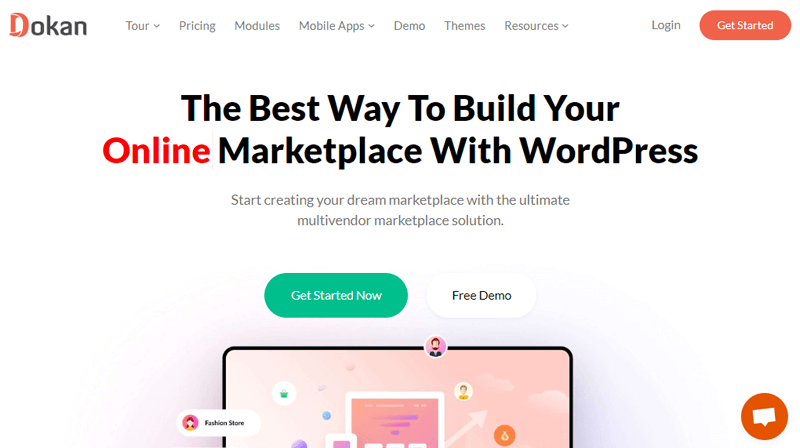
Using this platform, building a multi-vendor marketplace like Amazon or eBay becomes quite easy. So, start your small business to sell your products online, or create a marketplace.
Moreover, the products can range from digital, and physical to variable products. Besides, you can earn through commissions via vendor commissions, product-based commissions, etc.
Pros:
- Great control to the vendors to customize and make their store as they want.
- Compatible with most of the best WordPress plugins and WooCommerce themes.
- Get detailed sales reports to get an overview of the store’s performance.
- Product review function to gain customer trust.
- Control over who can sell and who can’t.
Cons:
- Quite expensive for startups.
- Beginners may find the setup process a little overwhelming.
- You’ll not get the domain if you’re using the free version.
Pricing:
Dokan is available in both free and premium versions. So, you can download the free version from the plugin directory of WordPress.org or its original site. After that, add it to your WordPress dashboard, or install it right from your dashboard.
To get the premium modules and features, you’ve to purchase one of the following pricing plans:
- Starter: $149/year, 1 site license, 2 pro modules, premium features like social login, product bulk edit, and more.
- Professional: $249/year, 3 site licenses, 12 pro modules, everything in the Starter plan plus seller verification, vendor review, etc.
- Business: $499/year, 5 sites license, 21 pro modules, everything on Professional plan plus auction, product advertising, and others.
- Enterprise: $999/year, 20 sites license, live chat plus priority support, and all features.
For more detail, check our Dokan review.
5. Easy Digital Downloads (EDD)
In search of an eCommerce platform to sell your digital products? If yes, then the best eCommerce platform for your small digital store is Easy Digital Downloads. This solution works alongside WordPress similar to WooCommerce and Dokan.
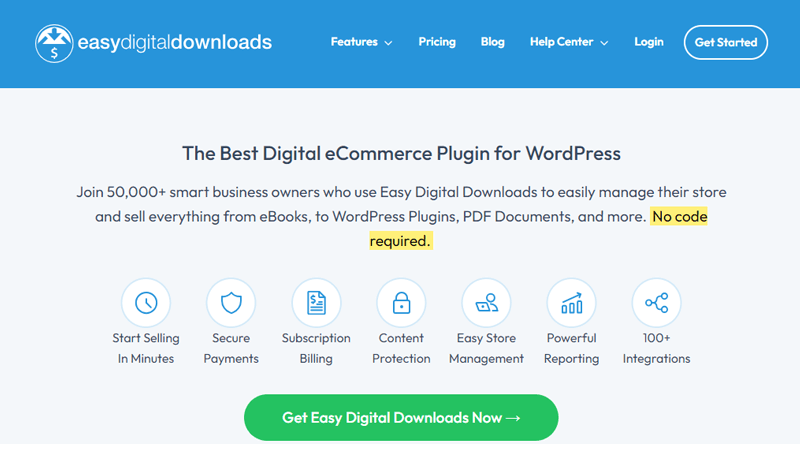
But here, you can only sell digital products. And that can be downloadable items like eBooks, music, videos, WordPress plugins/themes, PDF files, or any other media file. While talking about its features, it contains tons of options for adding a shopping cart or offering discount codes.
Moreover, you’ll also get detailed sales reports to analyze your sales. Also, you’re able to manage the customer records to track every customer, and more.
Pros:
- Supports integration to many payment gateways like Stripe, PayPal, Apple Pay, etc.
- Give unlimited or restricted access to customers to download the purchased files.
- Integrates well with all the major WordPress plugins, themes, and tools.
- Take advantage of the complete RESTful API, making it a developer-friendly platform.
Cons:
- A lifetime plan isn’t available.
- Comparatively, the price is costlier.
- No free trial for the personal plan.
Pricing:
EDD has both free and premium versions. So, you can download its free version from the plugin directory of WordPress.org. Or, just directly install it from your WordPress dashboard.
In case you’re planning to use the pro version, then here are its pricing plans:
- Personal Pass: $99.5/year, 1 site license, perfect for beginners, includes email marketing tools, email support, and updates.
- Extended Pass: $199.5/year, 1 site license, includes payment gateways, sell subscriptions, etc.
- Professional Pass: $299.5/year, 1 site license, includes premium extensions, wish lists, marketplace functionality, and more.
- All Access Pass: $499.5/year, unlimited sites, includes 79 extensions, integration to Slack, Gravity Forms, etc.
Stuck between WooCommerce vs Easy Digital downloads, check our comparision article.
6. BigCommerce
As the best overall eCommerce platform, BigCommerce is very versatile among other platforms. It offers a great range of features that allow you to start an online store of any business and niche.
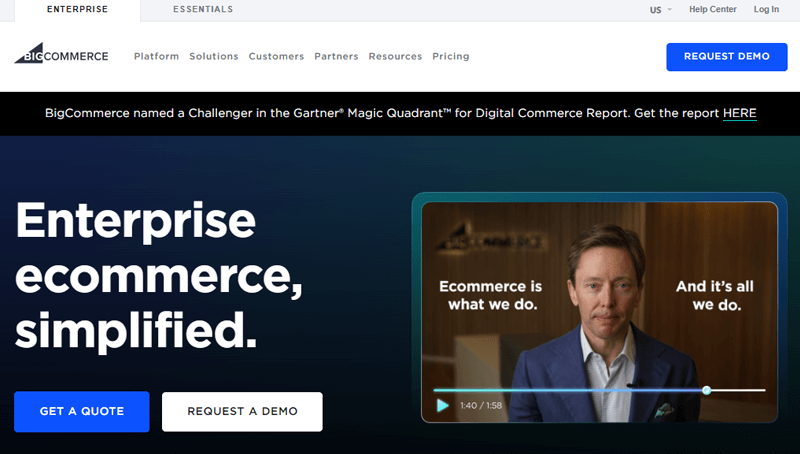
BigCommerce allows you to easily design your online store using its highly customizable lists of a few free and premium templates. Also, if you’ve some coding knowledge, then you can easily customize it further to make it look best for your small business.
Although preferred mostly by existing businesses, you can also completely start your online shop business. It provides you with 24/7 support from experts to help you with any issue that you face and help you design your online store the way you want.
Pros:
- Allows you to edit and customize as you want.
- Mobile-friendly and responsive.
- Comes with different plans that are customizable according to your needs.
- Very flexible and scalable.
- Provides a 15-day free trial.
Cons:
- It has a limited number of themes.
- Expensive for higher volume packs.
- Abandoned cart saver features only on expensive plans.
Pricing:
As a premium platform, the pricing plans it contains are:
- Standard: Costs $29 per month, and comes with features like checkout, gift cards, reporting, etc.
- Plus: Costs $79 per month, all the Standard plan features plus like persistent carts, stored credit cards, etc.
- Pro: Costs $299 per month, all the Plus plan features plus Google customer reviews, product filtering, and more.
Check out its comparison with other top platforms here: BigCommerce vs WooCommerce and BigCommerce vs Shopify.
7. Squarespace
Mostly preferred by any small online business, Squarespace is the best eCommerce platform on the web. It’s versatile and provides great drag-and-drop design tools to create a great online store without having to invest a huge amount of time.
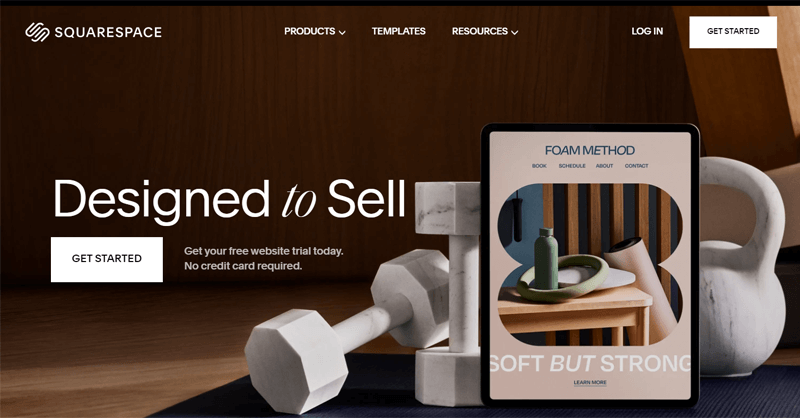
Moreover, Squarespace comes with a different elegant choice of templates that you can use to make your online store. It also comes with many different features to make your site featureful.
For instance, customizable promotional pop-ups and banners and abandoned cart recovery. As well as automatic shipping rate calculations, customizable discount rules, custom integration with APIs, and more.
Pros:
- Easy to set up and beginner-friendly.
- Simple drag-and-drop design tool.
- Works great for small businesses and stores.
- Elegant design templates.
Cons:
- Limited in design choice and customization.
- Charges transaction fees.
- you’ll get only 2 basic website metrics on the personal plan.
Pricing:
As a premium platform, it comes with different plans. The initial plan i.e. Personal costs $14/mo however it doesn’t contain the eCommerce feature. Other than that, the pricing plans are:
- Personal: Costs $16 and comes with a free custom domain, templates, and more.
- Business: Costs $23/mo, 3% transaction fee, sell unlimited products, accept donations, etc.
- Basic Commerce: Costs $28/mo, no transaction fee, all Business features plus point of sale, eCommerce analytics, and more.
- Advanced Commerce: Costs $52/mo, all Basic Commerce plan features plus advanced shipping, discounts, etc.
Quickly look at our article on Squarespace vs WooCommerce to solve your confusion.
8. Weebly
With millions of users, Weebly is a very famous website builder. Although it started focusing on eCommerce much later than others, it’s one of the best eCommerce platforms for your small business online store.

Moreover, you can choose a unique online store design with a customizable theme to showcase your products. Ans with its easy-to-use drag & drop builder helps you launch your online store quickly.
It requires no coding knowledge but you can also use HTML to customize it further. You can easily create a website for your business along with blogs but it lasts SEO as other platforms.
Pros:
- Easy drag-and-drop design tool.
- Reasonable price.
- Responsive and mobile-friendly.
- Requires no coding knowledge.
Cons:
- New to eCommerce so lacks some features.
- Charges transaction fee.
- Also, you cannot connect any custom domain.
Pricing:
It’s a very cheap platform that provides a basic plan for free.
It also has a paid plan, and the premium plans containing eCommerce features are discussed below:
- Personal: $10 per month, unlimited items, digital goods, inventory management, and more.
- Professional: Costs $12 per month with free SSL security, unlimited storage, free domain, and more.
- Performance: $26 per month, shopping cart, unlimited items, items badges, quick shop, and more.
If you’re building a website and stuck between whoch one to choose, then check our aticle on WordPress vs weebly.
9. Adobe Commerce
Adobe Commerce is one of the best eCommerce platforms that work well for making high-end online stores for any big or small business. It’s a very versatile option that provides you with some important features and high customization options.
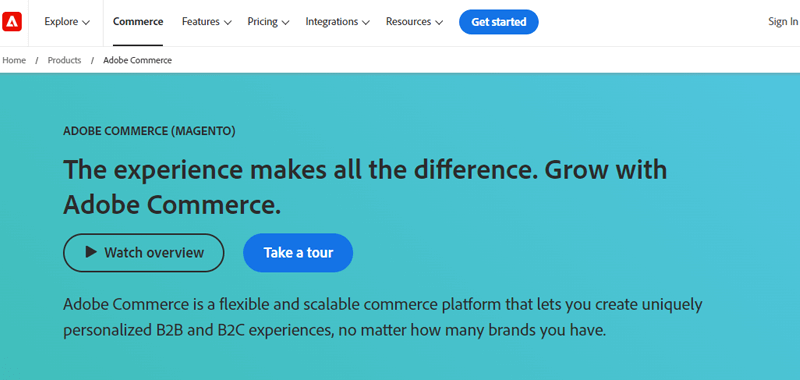
However, it can be hard to get familiar with but it provides a huge library of tutorials and support to help you with that. There is also a huge number of developers available to help you with any issues.
It provides you with features like discounts, recurring payments, the ability to grind SEO, adjust content per user, and much more. Often people go with the free option as the paid can get expensive and is only preferred by huge businesses and large eCommerce businesses.
Pros:
- Compatible with every kind of business.
- Allows integrating custom features
- Provides strong SEO.
- Highly customizable.
Cons:
- Can be expensive.
- Not for beginners.
Pricing:
Adobe Commerce is a premium platform and for the pricing details you need to talk to the customer support of Adobe Commerce. The pricing includes core application support, employment tools, 50GB of testing, and more.
10. PrestaShop
Similar to WooCommerce, PrestaShop is an open-source and one of the best eCommerce platforms. It’s fully mobile-optimized and responsive and gives you good options for themes to choose from to showcase your products or sell them.
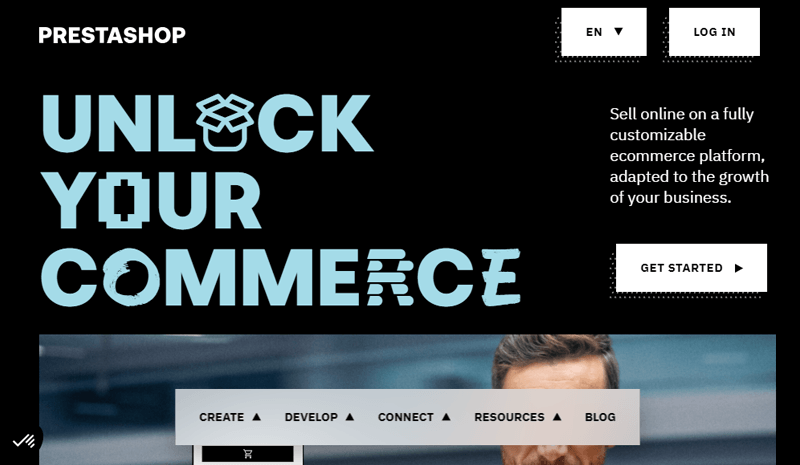
Moreover, it comes with regular updates and more customization. However, it’s a self-hosted platform which means you have to take care of hosting, domain name, SSL certificate, and more to start with your online shop.
Besides, it improves the visibility of your online store and reach more potential customers by displaying your items on Google Shopping. Also, you can access the most important marketplaces like Amazon or Rakuten.
Pros:
- Open-source and flexible.
- Both hosted and self-hosted options.
- Easy integration with add-ons.
- Good SEO.
- Has a good community of contributors and experts for any queries.
Cons:
- Limited third-party marketing integration.
- Might need to hire a web developer.
Pricing:
You can get PrestaShop for 100% free of cost but you’ve to take care of web hosting. Also, you can use it without add-ons and integrations.
11. OpenCart
Likewise, OpenCart is an open-source eCommerce software that allows you to create an elegant and feature-rich online store. And comes with many free and premium themes that are responsive and mobile-friendly. And supports more than 30 integrated payment gateways for you.
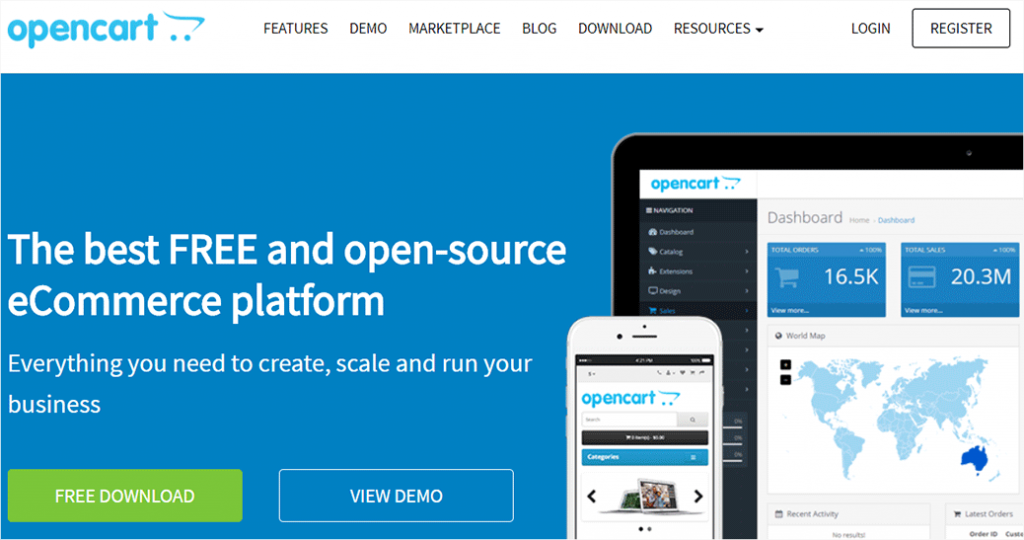
OpenCart
However, you need to take care of hosting, domain name, and the responsibility of creating your website yourself. As open-source, many developers and community members are working to make it better and you can keep your queries here to get good support from others.
Pros:
- Free and easy to use.
- Open-source so constant updates and new features.
- Integration of a large number of extensions.
- Supports different payment gateways.
- Has a large support community.
- No transaction fees.
Cons:
- You need to take care of hosting and domain names.
- Take care of hosting and domain yourself.
- The marketplace is quite messy.
Pricing:
OpenCart is a paid platform that comes with 3 premium plans. they are,
- Bronze Plan: Costs $59 per month perfect for smaller stores and comes with 1CPU and 2GB.
- Silver Plan: Costs $99 per month perfect for designed for SME, 2 CPU, and 4GB storage.
- Gold Plan: Costs $199 per month, perfect for enterprise, 4CPU, and 8GB.
12. Elementor
Elementor, one of the best WordPress page builders, also offers an eCommerce website builder. Using this full eCommerce suite, you get to easily build a complete online store. That means you can create every page for your visitor’s first interaction till their final purchase.

Moreover, Elementor gives you full freedom to design your store. Either start from scratch or use one of its pre-designed beautiful templates. In addition to that, you get to customize the store the way you like from its live editor. This makes your shop match your brand.
Not to mention, it contains key promotional features as well. With that, you can boost sales with pixel-perfect product landing pages and popups for every customer type.
Pros:
- Intuitive landing page builder for high conversion.
- Popup builder to announce sales, offer coupons or launch a new product line.
- Multiple layouts like full screen, modal, slide-in, and top/bottom bar.
- Offers 60+ eCommerce widgets like product titles, product images, add to cart, etc.
- Form builder to create engaging forms.
Cons:
- Doesn’t have a lifetime plan option.
- Not the best customer support you get.
- Need to be careful with the updates as they can cause glitches.
Pricing:
Elementor is a freemium plugin that’s available in both free and pro versions. However, to use the eCommerce builder feature, you’ve to purchase Elementor Pro. Not to worry, the starting price of it is quite decent and best for creating your small business eCommerce website.
So, there are 4 plans for its premium version, and they are:
- Essential: $59 per year, 1 site license, contains 90+ basic & pro widgets, 300+ basic & pro templates, 60+ website kits, premium support, and more.
- Advanced: Costs $99 per year for up to 3 sites, 82 pro widgets, theme builder, and more.
- Expert: Costs $199 per year, 25 sites license, all Essential plan features, 20 expert website kits, and expert network profile.
- Agency: Costs $399 per year, 1000 sites license, and all expert plan features.
If you’re confused between Elementor vs Squarespace, then do check our compatrision article.
13. Joomla’s J2Store
With over 350,000 downloads, Joomla’s J2Store is one of the best eCommerce platforms to make your online store for a small business. It’s a very flexible shopping cart and eCommerce solution that works best with Joomla.
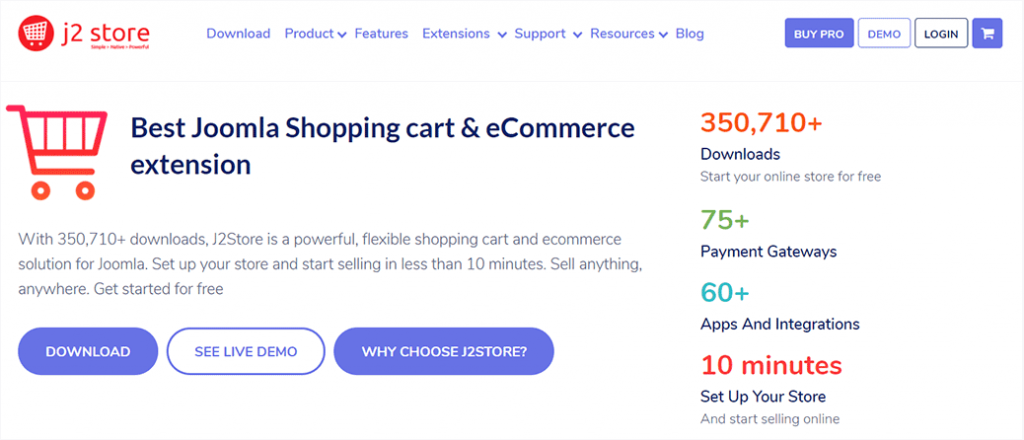
Moreover, it allows you to easily create your online store and start selling your products in no time. You can also include major features like reward points, bulk discounts, and integration with Amazon using its 100+ extensions and plugins.
Moreover, it provides great support for J2Store and has a great community support forum. It also has complete guide documentation and a demo for anyone to learn.
Pros:
- Free and easy to use.
- Comes with different important features.
- Supports multilingual.
- Mobile-friendly and responsive design.
Cons:
- Need Joomla to use J2Store.
Pricing:
J2Store is free of cost to start. So, you can easily start using this platform from its original site.
14. Ecwid
Ecwid is one of the best eCommerce platforms for any small business and startup. Using this solution, you get the option to integrate your shop with a site you already have. Other than that, you can also start a new store with a domain name and then integrate Ecwid.
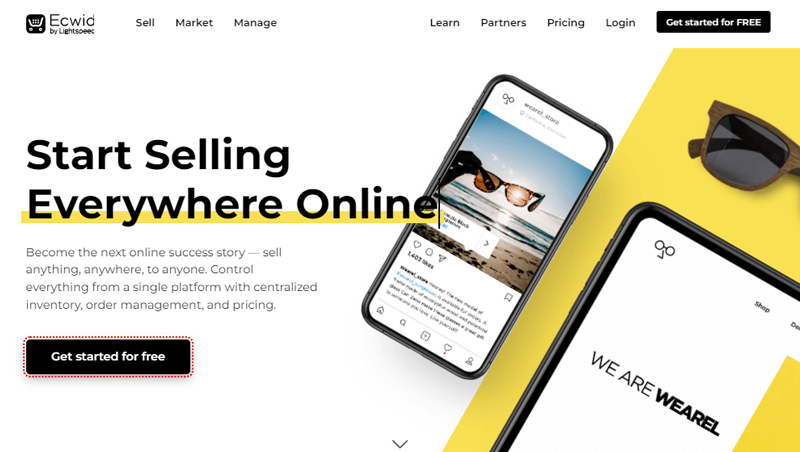
The best part about it is that it supports all the other major platforms including Drupal, Weebly, Wix, Joomla, WordPress, etc. And to ease you with designing your store, Ecwid provides you with an intuitive builder with free customization options.
Not only that, but you can also sync your store to sell everywhere. Like on popular channels including social media, Google, and marketplaces like Amazon.com.
Pros:
- Easy order and inventory management from a single dashboard.
- Ability to create a mobile app for the App stores.
- Offers 50+ payment options.
- Sell subscriptions or physical or digital products.
- Manages updates, SSL certificates, security, etc. itself.
Cons:
- Limits in the number of products you can sell when using the free plan.
- May face difficulty when setting it up with integrations.
Pricing:
If you’ve got just a few products to sell for your small business, then using the free version of Ecwid can be enough. And you can get the platform right from its original website.
For more options, you’ve to purchase the paid version. It offers the following pricing plans:
- Venture: $21/mo, free features plus discount coupons, advanced SEO tools, inventory management, social media tools, etc.
- Business: $39/mo, all the Venture plan features plus marketplaces, product dimensions, create orders, and more.
- Unlimited: $89/mo, all the Business features plus custom shopping app, point of scale, etc.
For detail you can check our comparision article on Ecwid vs Shopify and Ecwid vs WooCommerce.
15. Centra
Next on the list is Centra, this eCommerce platform comes with built-in tools for fashion & lifestyle brands. Besides you can manage multiple storefronts of your online store from one back end and segment order and inventory data per market.

Moreover, customize your storefronts with local pricing, languages, content, currencies, and size charts, based on consumers’ locations. Also, you can sell in 100+ local currencies in every possible market and drive conversion.
Additionally, you can build a checkout with local payment methods, delivery options, and price lists based on the customer’s location. Further, create separate price lists per territory or currency. Also, route to the best PSP depending on location to optimize conversion.
Pros:
- It’s user-friendly.
- No extra apps and integrations are needed.
- It has modules for both Direct-to-Consumer and Digital Wholesale.
- You’ll have full control over all channels of digital commerce.
- Easily tailor content per market and customer.
Cons:
- Only 5 payment integrations available.
Pricing:
For pricing, you need to book a demo and contact Centra representative.
16. Shift4Shop
Although not for beginners, Shift4Shop is one of the best eCommerce platforms to make an online shop for your small business. It requires a good set of technical skills to get the best out of the platform. However, it comes with lots of advanced features and functions that work best to make online stores.

Shift4Shop is best for making a functional and featureful online store so it might not be the best for an elegant design. But this also means more features like unlimited storage, no transaction fee, and more.
Additionally, choose from dozens of professionally designed, industry-specific templates. All of which are mobile-friendly, SEO-optimized, and highly customizable. So, customize your site using our intuitive web design tool, and edit the HTML and CSS directly.
Pros:
- Comes with great functionality and features like unlimited storage and no transaction fee.
- Supports all important integrations like Mailchimp.
- Provides unlimited storage.
- Charges no transaction fee.
- Helpful community with expert developers.
Cons:
- Requires technical skills to get started.
- Templates are outdated.
- Not for beginners.
Pricing:
For an unlimited, enterprise-grade plan for free, then a minimum of $500 processes per month or starting at $29 per month with PayPal for new customers only. Also comes with 100+ free themes, fraud protection, migration assistance, etc.
17. GoDaddy Online Store
Along with a website builder and domain registrar, GoDaddy also provides one of the best eCommerce platforms for you to make your small business online store. It’s a fully hosted shopping store that offers basic integration with eCommerce features.
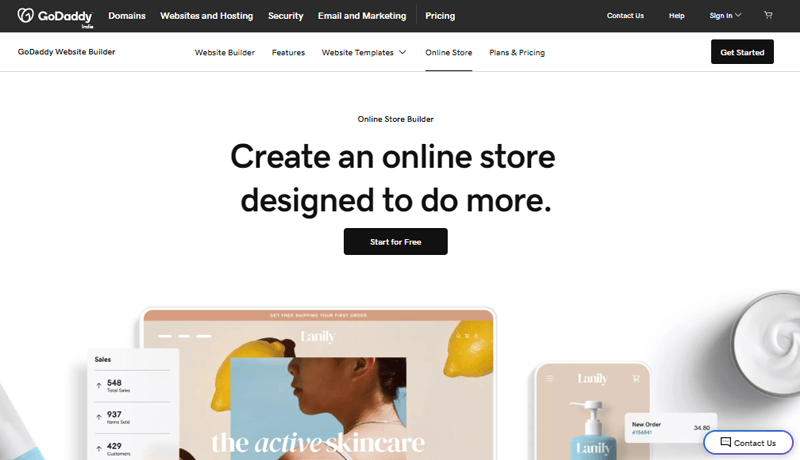
You can easily make your online store using its easy website builder and design your professional-looking website. It comes with 100+ website templates to choose from which are responsive and mobile-friendly.
GoDaddy’s online store solution provides you with 24/7 support from experts to help you with any obstacle that you face. It also has many different important features like PayPal integration, SSL security, social media, email marketing integration, and many more.
Pros:
- Easy to use drag and drop page builder tool.
- Comes with 100+ website templates.
- You can add up to 5,000 products.
- Integration with social and email marketing features and Google Analytics.
- Built-in shopping cart with fast checkout and abandoned cart recovery feature.
Cons:
- Some of its features lack the quality and depth of other eCommerce platforms.
- Can’t sell products across social media directly.
- Limited creative control due to the use of ADI.
Pricing:
GoDaddy’s online store solution comes with all of its eCommerce features with premium plans.
- Basic Plan: Costs $10.99 per month with SSL security, domain connection, guidance and analytics, etc.
- Standard Plan: Costs $11.99 per month with 20 social media platforms, social posts & responses, 500 email sends per month, etc.
- Premium Plan: Costs $14.99 per month with unlimited social media platforms, unlimited social posts, 25,000 email sends, and more.
- eCommerce Plan: Costs $16.99 per month with product listings, flexible payments, flexible shipping options, and more.
18. Big Cartel
Big Cartel is one of those powerful eCommerce platforms best to make an online store for your small business on the web. Although it lacks a huge library of features like other platforms, it works great for artists and makers to start their online stores.
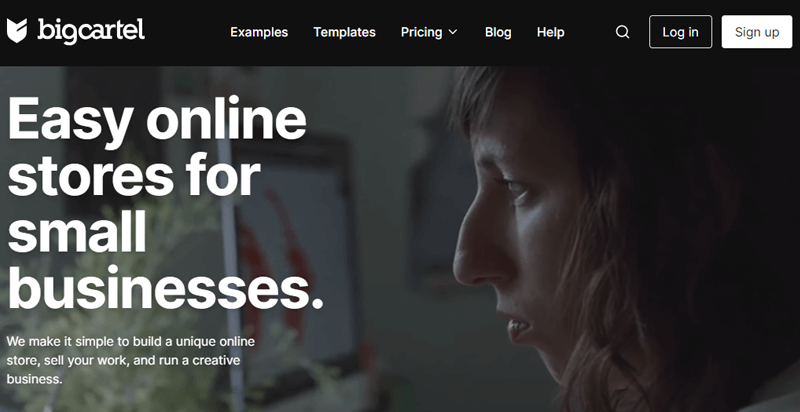
Furthermore, it comes with a simple and easy-to-use dashboard interface that helps manage your online marketplace. It comes with 15+ online store templates that are responsive and mobile-friendly. However, you need another editor to customize your templates to make them fit your site.
In addition to that, it provides statistics on the visitors, views, category trends, and ratings along with Google Analytics integration. You can also easily include features like adding categories, managing inventory, creating discounts, and more.
Pros:
- Simple and easy-to-use platform.
- Mobile-friendly and responsive templates.
- Comes with different features.
- Perfect for artists to sell their art and pieces.
Cons:
- Coding is important for further customization.
- Requires different builders to manage a store and customize a theme.
- Features lack depth and quality.
Pricing:
The free plan is called the Gold plan and using it allows you to sell up to 5 products.
While there are paid options also with the following pricing plans:
- Platinum Features: Costs $15/mo, up to 50 products, bulk editing, shipment tracking, etc.
- Diamond Features: Costs $30/mo, up to 500 products, all Platinum plan features.
To know more, check our article about Big Cartel vs Squarespace comparision article.
19. Square Online
Another best-selling and affordable eCommerce platform for small businesses is Square Online. Actually, Square allows you to sell both in-person and online market ways.
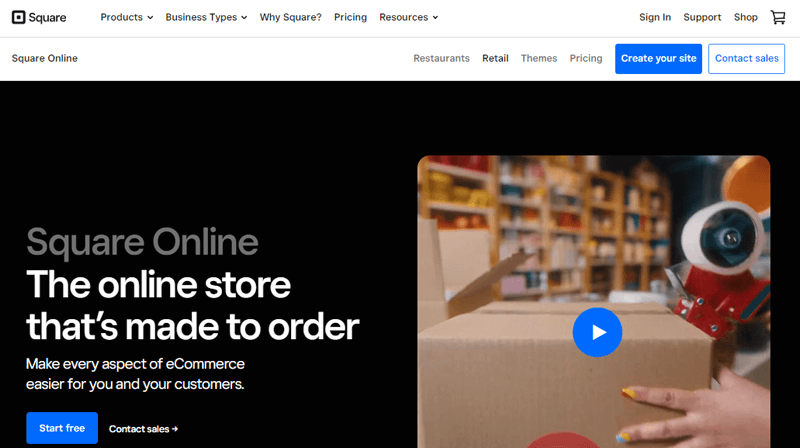
To turn your business into an online store, use Square Online which builds an eCommerce site. And the business can be of any type. According to which business type is yours, you can use one of its professional site designs available in categories: retail, service, non-profit, and restaurants.
Moreover, Square provides a Point of Sale (POS) system. If you use a POS system, then you can easily migrate your products from it and work on inventory management.
Pros:
- Easy-to-use store builder so you don’t have to do any coding.
- Multiple order ways like shipping, pickup, delivery, QR code ordering, etc.
- Contains built-in SEO tools to ease shoppers finding your business on search engines.
- Built-in payment gateways that accept major credit cards, PayPal, Square Pay, etc.
- Free services like fraud protection, dispute management, etc.
- Able to sell unlimited products.
- Free domain for 1 year.
Cons:
- Limitation on the available customization options.
- Not great in customer support.
- Contains account stability issues.
- There’s a slight learning curve for beginners.
Pricing:
Square Online is available in free and paid plans. You can sell unlimited products even when using this free plan. The option to start using this platform is right on its original website.
There are 3 pricing plans also present in its premium version. They are:
- Plus Plan: $29 per month, features like custom domain, free domain for 1 year, custom fonts upload, no square ads, etc.
- Premium Plan: $79/month, features like lower processing rates, real-time shipping rates, premium customer support, and more.
20. Sellfy
An easy-to-use website builder best for small business eCommerce platforms selling different kinds of products is Sellfy. A great thing is that you can also sell your merchandise. So, you can design, create, and sell on-demand products from one storefront.
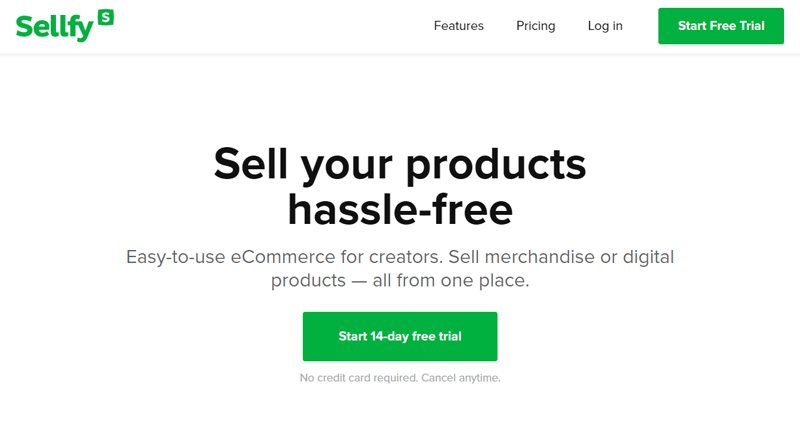
Moreover, there are 3 different ways you can sell your products with Sellfy. One is to connect your Sellfy store to your existing site. Another is to attach your store to a custom domain.
The final option is to use the ‘Buy Now’ button and other embed options. With that, you can make sales from multiple platforms including sites and social media.
Pros:
- Optimized for mobile devices to provide smooth checkout on every device.
- Supports multiple languages and is translation-ready.
- Contains marketing features like discount codes, email marketing, etc.
- Doesn’t ask for transactional fees.
- Able to sell multiple product types like physical, subscription, digital, merchandise, etc.
- Supports custom domain, hosting, security, and email accounts.
Cons:
- Can improve for better SEO functions.
- Limitation on the integration of payment solutions.
- Should use Zapier to get most third-party tools.
Pricing:
There are both free and paid plans for Sellfy. The free plan allows you to sell up to 10 products which can be physical products or print-on-demand products. You can get started with it from its original site.
The premium plans offer more features, they are:
- Starter: $29/mo, everything on the free plan, unlimited products, products can also be digital and subscription, able to connect your domain, and 2000 email credits.
- Business: $79/mo, all features of the Starter plan, store design migration, 10K email credits, etc.
- Premium: $159/mo, all Business plan features plus product migration, priority support, and 50K email credits.
21. X-Cart
X-Cart is a scalable eCommerce solution that can suit any business type. And it can be from enterprise, multivendor marketplace, and international to retail and small business.
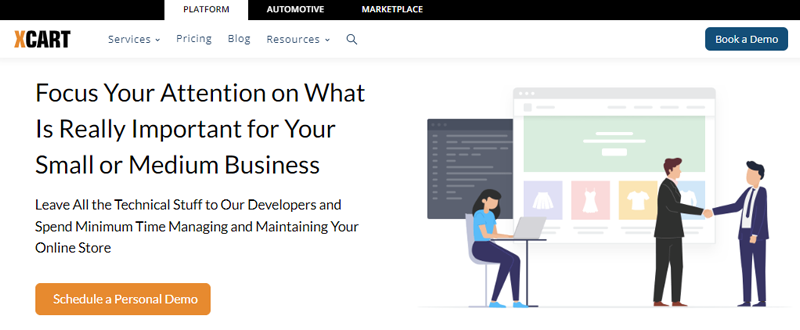
The best part about it contains lots of features and tools. So, you’ll get shipping options, payment modules, and whatnot. And with its ready-made management system, you can upload your products and start selling easily.
As an open-source platform, it’s ideal for developers or users who know coding and setup. However, the X-Cart team is also there to help you with managing your online store.
Pros:
- Provides lifetime subscription plans.
- Able to integrate it with WordPress.
- Virtually intuitive interface with easy navigation.
- Includes great SEO features.
- Contains marketing tools, social media integration, popups, product reviews, etc.
Cons:
- Getting full support requires an extra cost to pay.
- With lifetime plans, the cost becomes relatively expensive.
- Need to have coding and setup knowledge.
Pricing:
X-Cart has both free and premium plans. The free plan suits best for startups. Some features include support for unlimited products, gateway support, etc.
Also, the premium plan includes $199 per month and includes 100+ payment processors, mobile checkout, custom checkout, phone pondering, invoicing, and more.
22. Quick eSelling
Quick eSelling is a smart and flexible eCommerce platform with 2 different solutions. They are B2C (Business-to-Customers) eCommerce and B2B (Business-to-Business) eCommerce. That means it can easily connect manufacturers, wholesalers, and retailers with their customers.
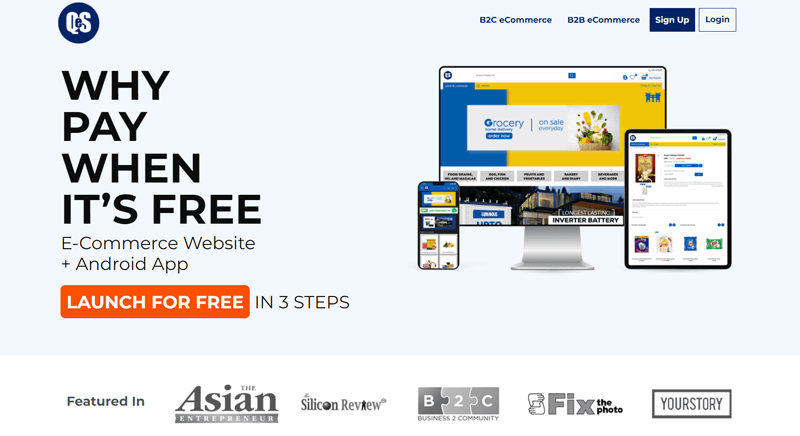
With the free platform, you get all the standard features such as custom domain configuration, inventory management, etc. With that, you can create an online store, and native Android app, and add up to 1000 products to sell.
However, if you want to scale and grow your business, then it’s also possible. There are premium plans that offer more advanced features like custom site design, custom shipping methods, etc.
Pros:
- Comparatively, an easier platform to set up and manage.
- Able to manage your business with a single CRM.
- Contains a free version plus a free trial for paid ones.
- Integrates well with all major payment gateways.
- A fully hosted platform so no hosting charges.
Cons:
- Limit on the number of products to sell in the free plan.
- Unable to delete products in bulk.
- Not the best at giving customer support.
Pricing:
You can easily get started with the free solution for building your eCommerce solution.
Conclusion
We hope this helped you know about the best eCommerce platforms on the web for your small business. If you are thinking of starting your small online business and want to use an elegant yet featureful solution, then you can use this article as a reference to choose the best for you.
In case you choose a platform in WordPress, then here’s the list of the best eCommerce WordPress themes for your help.
Despite this huge list of options, you have to choose the one that satisfies your requirements and works the best for your business and store. We wish you the best with your journey to starting an online store.
Also, check our latest articles on the best WordPress themes for education consultancy sites and Tutor LMS review.
